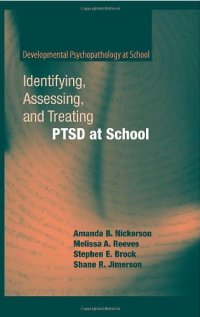
Ebook: Identifying, Assessing, and Treating PTSD at School
- Tags: Child and School Psychology, Education (general), Psychotherapy and Counseling, Developmental Psychology, Social Work, Pediatrics
- Series: Developmental Psychopathology at School 2
- Year: 2009
- Publisher: Springer US
- Edition: 1
- Language: English
- pdf
By age 16, significant – one might even say "alarming" – numbers of students are demonstrating signs of posttraumatic stress disorder (PTSD). Students with PTSD are more likely to develop a range of problems, from delinquent behavior to eating disorders to substance abuse to dropping out. For the school-based professional, the ability to recognize these symptoms and warning signs is essential.
Emphasizing prevention as well as intervention, Identifying, Assessing, and Treating PTSD at School clearly defines PTSD, explains its adverse affects on children’s academic and social-emotional skills, and offers expert guidance on how to recognize student needs and provide appropriate services. This volume, designed as a practical, easy-to-use reference for school psychologists and other educational professionals:
- Makes the case for why school psychologists and their colleagues need to be more prepared, willing, and able to identify and serve students with PTSD.
- Identifies the causes, prevalence, and associated conditions of PTSD.
- Provides a review of screening, referral, and diagnostic assessment processes.
- Reviews appropriate treatments for students with PTSD.
Today’s youth live in an increasingly uncertain world, and school psychologists, counselors, social workers, and general and special education personnel will find Identifying, Assessing, and Treating PTSD at School an invaluable resource in their practices.
By age 16, significant – one might even say “alarming” – numbers of students are demonstrating signs of posttraumatic stress disorder (PTSD). Students with PTSD are more likely to develop a range of problems, from delinquent behavior to eating disorders to substance abuse to dropping out. For the school-based professional, the ability to recognize these symptoms and warning signs is essential. Emphasizing prevention as well as intervention, Identifying, Assessing, and Treating PTSD at School clearly defines PTSD, explains its adverse affects on children’s academic and social-emotional skills, and offers expert guidance on how to recognize student needs and provide appropriate services. This volume, designed as a practical, easy-to-use reference for school psychologists and other educational professionals: (1) Makes the case for why school psychologists and their colleagues need to be more prepared, willing, and able to identify and serve students with PTSD. (2) Identifies the causes, prevalence, and associated conditions of PTSD. (3) Provides a review of screening, referral, and diagnostic assessment processes. (4) Reviews appropriate treatments for students with PTSD. Today’s youth live in an increasingly uncertain world, and school psychologists, counselors, social workers, and general and special education personnel will find Identifying, Assessing, and Treating PTSD at School an invaluable resource in their practices.